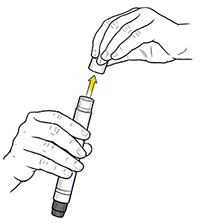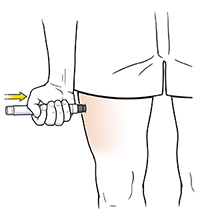A
B
C
D
E
F
G
H
I
J
K
L
M
N
O
P
Q
R
S
T
U
V
W
X
Y
Z
Click a letter to see a list of medical procedures beginning with that letter.
Click 'Back to Intro' to return to the beginning of this section.
Using an Epinephrine Autoinjector
Your healthcare provider has prescribed the epinephrine (adrenaline) autoinjector for you. The epinephrine autoinjector makes it easier for you to give yourself a shot during an emergency allergic reaction. It also makes it easy for someone else to give you a shot if you can't do it yourself.
The autoinjector pen has a spring inside of it that moves the hidden needle into place. Once you use the autoinjector, you should throw it away.
 |
| Activate the EpiPen by removing the safety cap. |
 |
| Jab the injector against the outside of your thigh. |
Be prepared
-
Know how to use your specific brand of epinephrine autoinjector before you have an allergic reaction.
-
Have more than 1 epinephrine autoinjector. Carry 1 kit with you. Keep others in easy-to-find places at home, work, or other places you spend long periods of time.
-
Store epinephrine at room temperature. Don't keep it in places with extreme cold or heat, such as a car.
-
Check the expiration date on your epinephrine autoinjectors on a regular basis.
-
Throw away the epinephrine autoinjector after you use it. To do so, follow the instructions that come with the epinephrine autoinjector.
Prepare your family and friends
Wear a medical ID bracelet or necklace. This ID lets others know about your allergy and what to do in an emergency. Tell your family, friends, and coworkers what they should do if you have a severe allergic reaction:
-
Tell them to call 911 if it seems you're having a reaction.
-
Tell them to start CPR (cardiopulmonary resuscitation) if you stop breathing.
-
Ask them to make sure you're lying down with your legs raised during the reaction.
-
Show them how to use the epinephrine autoinjector and where to give it to you on the outside of the thigh.
What to do if you have an allergic reaction
If you have an allergic reaction, give yourself a shot using the epinephrine autoinjector right away. This will help stop the reaction until medical help arrives. When you need to use it:
-
Use any site on the outside of your thigh. There's no need to look for the best injection site or to give the shot in the buttocks or arm. The injection can even be given through your clothes, if needed.
-
Remove the safety cap(s) from the autoinjector. Then follow the instructions that come with the pen.
-
With the tip of the epinephrine autoinjector pointed toward the outside of your thigh, jab the pen against your thigh. This releases a spring-activated plunger that pushes the hidden needle into the thigh muscle, giving you a dose of epinephrine. Hold the pen in place for 10 seconds. Then pull the pen straight out, away from the thigh, to remove the needle. Massage the area where you injected the medicine for about 10 seconds.
-
Call 911 right after the injection.
-
Lie down and raise your legs while you wait for help to arrive.
How to prevent allergic reactions
-
Stay away from the things that cause your allergic reaction.
-
Tell all your healthcare providers and your pharmacist about any allergies you have to medicines. Keep a list of alternative medicines handy.
-
Ask your provider if allergy shots (immunotherapy) will help you.
Follow-up care
After an allergic reaction, follow up with your provider or as advised.
Call 911
Call 911 right away if you have any of these signs of severe allergic reaction:
-
Fast pulse
-
Wheezing, coughing, or trouble breathing
-
Swollen lips, tongue, or throat
-
Trouble swallowing or feeling like your throat is closing
-
Hoarse voice
-
Drowsiness, fainting, or loss of consciousness
-
Upset stomach (nausea) and vomiting
-
Itchy, blotchy skin, a rash, or hives
-
Pale, cool, damp skin
-
Confusion
Online Medical Reviewer:
Eric Perez MD
Online Medical Reviewer:
Jessica Gotwals RN BSN MPH
Online Medical Reviewer:
Paula Goode RN BSN MSN
Date Last Reviewed:
6/1/2022
© 2000-2024 The StayWell Company, LLC. All rights reserved. This information is not intended as a substitute for professional medical care. Always follow your healthcare professional's instructions.